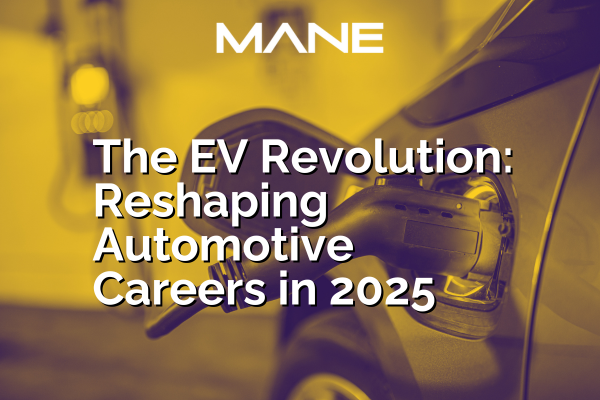The EV Revolution: Reshaping Automotive Careers in 2025
14 Feb, 20252minsThe latest figures from the UK automotive sector paint a compelling picture of an industry i...

The latest figures from the UK automotive sector paint a compelling picture of an industry in transition. With battery electric vehicles (BEVs) capturing 21% of new car registrations in January 2025 and used EV sales surging by 57.4% year-on-year, the shift towards electrification is accelerating faster than ever. This transformation isn't just changing what we drive – it's fundamentally reshaping the automotive workforce landscape.
The Numbers Tell a Story
The SMMT's recent data reveals several key trends that have major implications for automotive professionals:
• BEVs now represent the second-largest sector in new car sales, trailing only petrol vehicles
• Used EV market share has reached a record 2.5%, up from 1.7% in 2023
• The combined new and used electrified vehicle market shows robust growth, with over half a million ultra-low or zero-emission cars sold in 2024
What This Means for Automotive Careers
1. Electrical Engineering Takes Centre Stage
The rise of EVs is creating unprecedented demand for electrical engineers and power electronics specialists. Traditional mechanical engineering roles aren't disappearing, but they're being transformed by the need to integrate electrical systems with mechanical components. Automotive professionals who can bridge this gap are becoming increasingly valuable.
2. Software Development Becomes Critical
Modern EVs are as much about software as hardware. The surge in EV adoption is driving demand for:
• Battery management system developers
• Charging infrastructure software engineers
• Connected vehicle platform specialists
• User interface and experience designers
3. Service and Maintenance Evolution
The growth in both new and used EV sales is reshaping the service sector. Technicians need new certifications and skills to work with high-voltage systems. The traditional mechanic role is evolving into that of an automotive technology specialist, requiring expertise in diagnostics software and electrical systems.
4. Supply Chain Transformation
The shift towards EVs is creating new roles in supply chain management, particularly in:
• Battery supply chain optimisation
• Sustainable materials sourcing
• Electric powertrain component logistics
• Charging infrastructure planning
5. Sales and Customer Experience
With EVs representing a significant change for many consumers, sales professionals need to develop new expertise in:
• EV technology and capabilities
• Charging infrastructure
• Government incentives and regulations
• Total cost of ownership calculations
The Skills Gap Challenge
While the market shows strong growth, the industry faces a significant skills gap. The SMMT's concerns about meeting government EV targets aren't just about production capacity – they're about having the skilled workforce needed to support this transition.
The January 2025 figures aren't just market statistics – they're a roadmap for career development in the automotive sector. As the industry continues its electric transformation, the opportunities for skilled professionals who can adapt and grow with these changes are substantial. Those who position themselves at the intersection of traditional automotive expertise and emerging EV technologies will find themselves in high demand. With the government maintaining its commitment to phase out new petrol and diesel car sales by 2030, the transformation of the automotive workforce will only accelerate.



